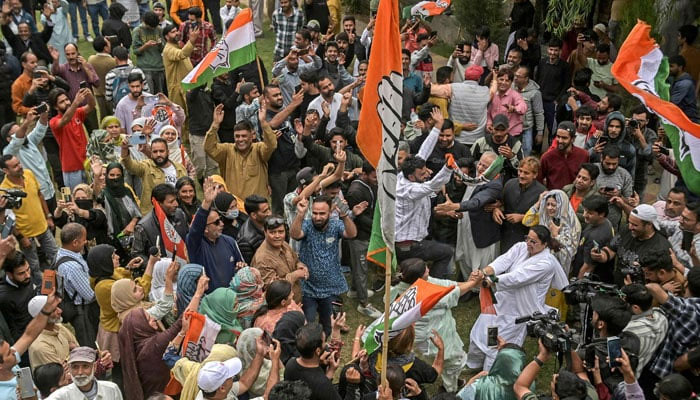IIOJK elections
BJP managed 29 seats, blow to Indian PM Narendra Modi’s efforts to solidify his grip on this occupied region
The elections in Indian Illegally Occupied Jammu and Kashmir (IIOJK) have delivered a resounding defeat to the Bharatiya Janata Party (BJP), with the Congress-National Conference alliance securing a clear majority. Out of the 90 seats contested, the alliance won 49, with the National Conference taking 42 seats, six going to the Congress, and one to the Communist Party of India (Marxist) (CPI-M). Meanwhile, the BJP managed only 29 seats, a blow to Indian Prime Minister Narendra Modi’s efforts to solidify his grip on this occupied region. For many, these results reflect the rejection of Modi’s oppressive policies in Kashmir, most notably the revocation of Article 370 in August 2019, which stripped the region of its special status. The Congress has hailed the election outcome as a defeat of the BJP’s ‘mischievous designs’ to engineer a majority in the occupied territory. The elections, held in three phases and witnessing a voter turnout of 63.88 per cent, were the first in IIOJK in a decade and the first since Article 370 was abrogated. Omar Abdullah, vice president of the National Conference and former chief minister, had emphasized that his party’s priority was the restoration of Occupied Jammu and Kashmir’s statehood, setting aside, for now, the contentious issue of Article 370. Abdullah is expected to lead the next government.
For Modi’s BJP, this election defeat is more than just a political setback -- it is a symbolic failure of his government’s Kashmir policy. The BJP’s decision to revoke Article 370 was intended to tighten India’s control over the region, but the forced assembly elections and subsequent results have only confirmed that the people of IIOJK reject his government’s oppressive tactics. Modi’s administration has overseen widespread abuses in the region, from arbitrary detentions and house arrests to severe censorship and brutal assaults on dissenters. Despite these violations of human rights, the people of Kashmir have made their voices heard through this election.
But while the BJP may have suffered a loss in these elections, the broader reality remains grim for the people of IIOJK. Kashmir has been under occupation for over seven decades, and for many observers, this election -- while significant - does not change the underlying fact that the people of Kashmir continue to live under the yoke of an occupying force. The struggle for their rights, freedom, and dignity persists, with many Kashmiris still languishing in prison, detained in the aftermath of Article 370’s abrogation. The international community, however, remains largely indifferent to these atrocities. Just as it turns a blind eye to Israel’s occupation of Palestine, it also ignores India’s brutalities in IIOJK. India’s strategic importance, particularly in countering China, and its status as a lucrative market in the global capitalist system, have shielded it from meaningful international scrutiny. The world’s obsession with India as an economic and geopolitical partner has left the Kashmiri people voiceless on the global stage. But the global community cannot continue to look away. The people of Kashmir deserve to be heard, and their rights must be acknowledged. Much like the Palestinians, the Kashmiris have endured decades of brutal occupation, but their fight for freedom is far from over. The results of this election should be seen as a clear message from the people of IIOJK: they are rejecting the BJP’s attempts to silence them, and they are demanding their right to self-determination. If the world continues to ignore their plight, it risks further enabling the continued subjugation of the Kashmiri people. Just as occupation cannot endure indefinitely, neither can the denial of basic human rights. From Palestine to Kashmir, the international community must stop turning a blind eye to oppression.
-
 What You Need To Know About Ischemic Stroke
What You Need To Know About Ischemic Stroke -
 Shocking Reason Behind Type 2 Diabetes Revealed By Scientists
Shocking Reason Behind Type 2 Diabetes Revealed By Scientists -
 SpaceX Cleared For NASA Crew-12 Launch After Falcon 9 Review
SpaceX Cleared For NASA Crew-12 Launch After Falcon 9 Review -
 Meghan Markle Gives Old Hollywood Vibes In New Photos At Glitzy Event
Meghan Markle Gives Old Hollywood Vibes In New Photos At Glitzy Event -
 Simple 'finger Test' Unveils Lung Cancer Diagnosis
Simple 'finger Test' Unveils Lung Cancer Diagnosis -
 Groundbreaking Treatment For Sepsis Emerges In New Study
Groundbreaking Treatment For Sepsis Emerges In New Study -
 Roblox Blocked In Egypt Sparks Debate Over Child Safety And Digital Access
Roblox Blocked In Egypt Sparks Debate Over Child Safety And Digital Access -
 Savannah Guthrie Addresses Ransom Demands Made By Her Mother Nancy's Kidnappers
Savannah Guthrie Addresses Ransom Demands Made By Her Mother Nancy's Kidnappers -
 OpenAI Reportedly Working On AI-powered Earbuds As First Hardware Product
OpenAI Reportedly Working On AI-powered Earbuds As First Hardware Product -
 Andrew, Sarah Ferguson Refuse King Charles Request: 'Raising Eyebrows Inside Palace'
Andrew, Sarah Ferguson Refuse King Charles Request: 'Raising Eyebrows Inside Palace' -
 Adam Sandler Reveals How Tom Cruise Introduced Him To Paul Thomas Anderson
Adam Sandler Reveals How Tom Cruise Introduced Him To Paul Thomas Anderson -
 Washington Post CEO William Lewis Resigns After Sweeping Layoffs
Washington Post CEO William Lewis Resigns After Sweeping Layoffs -
 North Korea To Hold 9th Workers’ Party Congress In Late February
North Korea To Hold 9th Workers’ Party Congress In Late February -
 All You Need To Know Guide To Rosacea
All You Need To Know Guide To Rosacea -
 Princess Diana's Brother 'handed Over' Althorp House To Marion And Her Family
Princess Diana's Brother 'handed Over' Althorp House To Marion And Her Family -
 Trump Mobile T1 Phone Resurfaces With New Specs, Higher Price
Trump Mobile T1 Phone Resurfaces With New Specs, Higher Price




